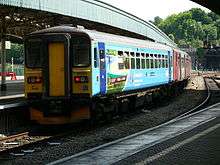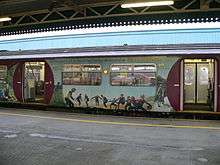Devon and Cornwall Rail Partnership

The Devon and Cornwall Rail Partnership is the largest Community Rail Partnership in the United Kingdom. It was formed in 1991 to promote the use of, and improvements to, rural railways in Devon and Cornwall, and also to promote the places served in order to improve the local economy.
The Partnership is based at the University of Plymouth and is backed by Devon County Council, Cornwall Council, and Plymouth City Council. Railway industry backing came initially from Wessex Trains but it withdrew in 2006 when its franchise was transferred to Great Western Railway, which had joined the Partnership the previous year.
Routes
There are six rural branch lines promoted by the Partnership, each supported by a Working Party and supported by local councils and designated as community rail lines by the Department for Transport.
- Atlantic Coast Line – Par to Newquay
- Looe Valley Line – Liskeard to Looe
- Maritime Line – Truro to Falmouth
- St Ives Bay Line – St Erth to St Ives
- Tamar Valley Line – Plymouth to Gunnislake
- Tarka Line – Exeter to Barnstaple
There are two further lines which radiate from Exeter – the Avocet Line and the Riviera Line – but are not designated as community railways and are not usually part of the work of the Partnership. They do, however, sometimes feature in "scenic railway" promotions by the Partnership, as do the region's heritage railway lines.
In addition, several railway stations have "Friends" groups supported by the Partnership and which undertake local promotion of services and take on work such as gardening and litter collection.
Investment
A Rural Transport Partnership grant from the Countryside Agency has provided £1 million investment for the lines during 2001-2007. This has enabled extra trains to be run, station improvements to be undertaken, and marketing campaigns to be established. Further funding has been secured by grants from the Rail Passenger Partnership Fund of the Strategic Rail Authority, and £235,000 from the European Union’s European Regional Development Fund funded marketing in 1997-1999.
The additional services thus funded have included:
- Sunday services on the Tamar Valley Line and the Maritime Line throughout the year, whereas previously they had run just in the peak summer
- Summer Sunday services on the Atlantic Coast and Looe Valley lines
- Extra trains on the Atlantic Coast and Tarka lines.
- Additional weekday trains on the Atlantic Coast Line in 2004 - Newquay’s best train service for many years.
- Station improvements on the Atlantic Coast, Looe Valley, Tamar Valley, and Tarka lines, and also a summertime ticket office at Looe station.
Promotion
A variety of promotional methods are employed, ranging from station or line timetables and scenic line guides, through to special merchandise offers. These target potential users and promote different activities such as walking, visiting country pubs, or birdwatching.
Walking
Several lines offer good walking opportunities and these are promoted through leaflets. For example, the Looe Valley Line Trails from the Tracks leaflet promotes four circular routes from different stations, and also six linear walks that allow walks along quiet lanes and paths from one station to another.
Rail Ale Trails
Starting with the Tarka Line in 2002, a rail ale trail has been established along each of the six lines in association with CAMRA. By collecting stamps from the participating pubs in a special leaflet, drinkers can claim special branded merchandise such as badges or tee shirts.
Birdwatching
A new leaflet, Spotting Wild Birds by Train was produced in 2007. It highlighted the Hayle Estuary, visible from the St Ives Bay Line, and the Looe Estuary on the Looe Valley Line.
Ticketing
A key part of the promotion of all the lines is the range of tickets available. Building on the success of established railway tickets such as Cheap Day Returns and Rover tickets, and the Cornish Railcard (which offers discounts to local residents), further savings have been offered through Group Save tickets and Carnets (books of 10 tickets sold at a discount).
Trains
A number of Wessex Trains DMUs were given special liveries to promote the lines in the Partnership. They work not just in Devon and Cornwall but further afield too and so can be seen at places such as Southampton, Cardiff Central, and Bristol Temple Meads railway stations. Most continue to work for Great Western Railway but from 2007 they were all either repainted into that company's livery or taken off lease and transferred to other operators.
- Class 153 single-car units carried a black and gold livery to promote the Devon and Cornwall Rail Partnership, or (from 2005) a blue livery and coloured pictures promoting the named line:
- 153302 Devon and Cornwall Rail Partnership
- 153308 Devon and Cornwall Rail Partnership
- 153329 St Ives Bay Line
- 153369 The Looe Valley Explorer
- 153374 Devon and Cornwall Rail Partnership
- 153377 Devon and Cornwall Rail Partnership
- 153380 Devon and Cornwall Rail Partnership
- 153382 Devon and Cornwall Rail Partnership
- Class 150 two-car units carried a maroon livery with coloured pictures promoting the relevant line:
- 150233 Lady Margret of Looe Valley
- 150240 The Tamar Kingfisher
- 150241 The Tarka Belle
- 150253 The Exmouth Avocet
- 150261 The Riviera Flyer
- 150265 The Maritime Line
See also
References
- Department for Transport (2007), Introduction to Community Rail
- Devon and Cornwall Rail Partnership (1999), Great Scenic Railways of Devon & Cornwall
- Devon and Cornwall Rail Partnership (2002), Looe Valley Line Trails from the Track
- Devon and Cornwall Rail Partnership (2005), Working in Partnership in Devon and Cornwall
- Devon and Cornwall Rail Partnership (2005), Explore the Beauty of the Tamar Valley and The Looe Valley by Rail
- Devon and Cornwall Rail Partnership (2005), Tarka, Riviera & Avocet Line Guide
- Devon and Cornwall Rail Partnership (2007), Spotting Wild Birds by Train


